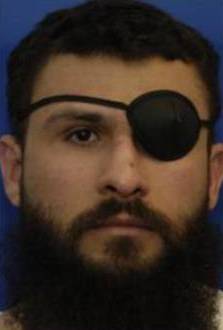
Abu Zubaydah is a Palestinian citizen born in Saudi Arabia currently held by the U.S. in the Guantanamo Bay detention camp in Cuba. He is held under the authority of Authorization for Use of Military Force Against Terrorists (AUMF).
Ibn al-Shaykh al-Libi was a Libyan national captured in Afghanistan in November 2001 after the fall of the Taliban; he was interrogated by American and Egyptian forces. The information he gave under torture to Egyptian authorities was cited by the George W. Bush administration in the months preceding its 2003 invasion of Iraq as evidence of a connection between Saddam Hussein and al-Qaeda. That information was frequently repeated by members of the Bush administration, although reports from both the Central Intelligence Agency (CIA) and the Defense Intelligence Agency (DIA) strongly questioned its credibility, suggesting that al-Libi was "intentionally misleading" interrogators.
Muntada al-Ansar was an Islamist forum page associated with Al-Qaeda. The forum's domain was in Malaysia.

Jama'at al-Tawhid wal-Jihad, abbreviated as JTJ or Jama'at, was a Salafi jihadist militant group. It was founded in Jordan in 1999, and was led by Jordanian national Abu Musab al-Zarqawi for the entirety of its existence. During the Iraqi insurgency (2003–11), the group became a decentralized network with foreign fighters with a considerable Iraqi membership.

An Iraqi insurgency began shortly after the 2003 American invasion deposed longtime leader Saddam Hussein. It is considered to have lasted until the end of the Iraq War and U.S. withdrawal in 2011. It was followed by a renewed insurgency.
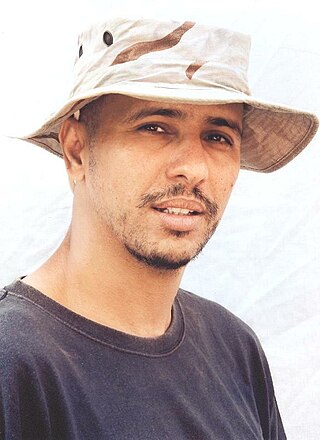
Mohamedou Ould Slahi is a Mauritanian engineer who was detained at Guantánamo Bay detention camp without charge from 2002 until his release on October 17, 2016.
The Saddam–al-Qaeda conspiracy theory was based on false claims by the United States government alleging that a secretive relationship existed between Iraqi president Saddam Hussein and the Sunni pan-Islamist militant organization al-Qaeda between 1992 and 2003. U.S. president George W. Bush used it as a main reason for invading Iraq in 2003.
Task Force 6–26 is a United States Joint military/Government Agency, originally set-up to find "High-Value Targets" (HVT's) in Iraq in the aftermath of Operation Iraqi Freedom. This Special Operations unit is very similar to JSOC Task Force 121 which was created to capture Saddam Hussein and high-ranking Al-Qaeda members. The various name changes seen by the group are to ensure Operational Security, although their makeup and goals largely remain the same. The main objective of Task Force 6–26 was the capture or liquidation of terror leader Abu Musab al-Zarqawi, who led Al-Qaeda in Iraq. The unit is made up of U.S. Special Operations Forces members including Delta Force, DEVGRU, 24th Special Tactics Squadron and the 75th Ranger Regiment along with the CIA's Special Activities Center. Other military and DIA personnel are believed to have been involved as 'limited' members of the unit, along with FBI agents.
This article is a chronological listing of allegations of meetings between members of al-Qaeda and members of Saddam Hussein's government, as well as other information relevant to conspiracy theories involving Saddam Hussein and al-Qaeda.
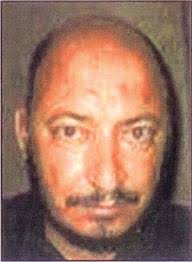
Abu Omar al-Baghdadi, born Hamid Dawud Mohamed Khalil al-Zawi was an Iraqi militant who was the Emir of the Islamic militant umbrella organization Mujahideen Shura Council (MSC), and its successor, the Islamic State of Iraq (ISI), which fought against the U.S.-led Coalition forces during the Iraqi insurgency.
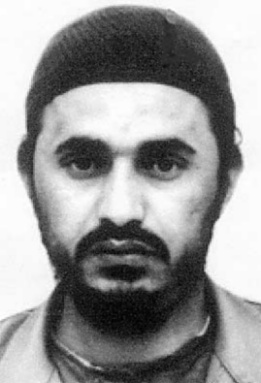
Abu Musab al-Zarqawi, born Ahmad Fadeel al-Nazal al-Khalayleh, was a Jordanian militant jihadist who ran a training camp in Afghanistan. He became known after going to Iraq and being responsible for a series of bombings, beheadings, and attacks during the Iraq War, reportedly "turning an insurgency against US troops" in Iraq "into a Shia–Sunni civil war". He was sometimes known by his supporters as the "Sheikh of the slaughterers".
Hassan Ghul, born Mustafa Hajji Muhammad Khan, was a Saudi-born Pakistani member of al-Qaeda who revealed the kunya of Osama bin Laden's messenger, which eventually led to Operation Neptune Spear and the death of Osama Bin Laden. Ghul was an ethnic Pashtun whose family was from Waziristan. He was designated by the Al-Qaida and Taliban Sanctions Committee of the Security Council in 2012.

Tanzim Qaidat al-Jihad fi Bilad al-Rafidayn, more commonly known as Al-Qaeda in Iraq, was a Salafi jihadist organization affiliated with Al-Qaeda. It was founded on 17 October 2004, and was led by Abu Musab al-Zarqawi until its disbandment on 15 October 2006 after he was killed in a targeted bombing on June 7, 2006 in Hibhib, Iraq by the United States Air Force.

It is believed that members of Al-Qaeda are hiding along the border of Afghanistan and northwest sections of Pakistan. In Iraq, elements loosely associated with al-Qaeda, in the Jama'at al-Tawhid wal-Jihad organization commanded by Abu Musab al-Zarqawi, have played a key role in the War in Iraq.
Abu Ghadiya was an al-Qaeda in Iraq (AQI) militant and smuggler. The United States Treasury Department claimed his real name was Badran Turki Hishan al-Mazidi and that he was born sometime between 1977 and 1979 in Mosul. However, other reports claimed that Abu Ghadiya was born in Damascus in 1976 and his real name was Sulayman Khalid Darwish. He graduated from the Damascus University Dentistry School sometime during the 1990s, until he later went to Afghanistan and joined al-Qaeda. He was primarily involved in the logistics of AQI's effort in Iraq and assisted in smuggling weapons, money and fighters across the Iraq–Syria border. The US claimed he was targeted and killed, in a cross-border raid conducted by the U.S. military and possibly the Syrian government as well on October 26, 2008. However, an al-Qaeda in Iraq obituary released in August 2006 says that Abu Ghadiya was killed by the Saudi-Iraqi border sometime in November 2004. The Syrian government protested the raid claiming, that it killed eight civilians. Journalists who reached the attack site reported claims by local people who said that the victims of the raid were all innocent civilians.

Marc Alexander Thiessen is an American conservative author, political appointee, and weekly columnist for The Washington Post. Thiessen served as a speechwriter for President George W. Bush from 2007 to 2009 and Secretary of Defense Donald Rumsfeld from 2001 to 2006.

The Pankisi Gorge crisis was a spillover of the Second Chechen War, with military dimension in Georgia early in the 2000s. Georgia was pressured by Russia and the United States to repress the threats of Al-Qaeda in the Pankisi Gorge.
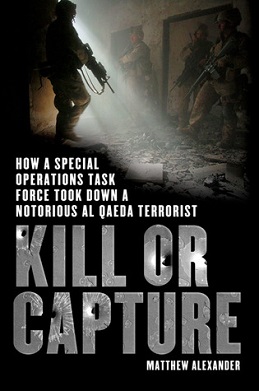
Kill or Capture: How a Special Operations Task Force Took Down a Notorious al Qaeda Terrorist is a book published by Macmillan Publishing in early 2011. The author, a former interrogator, criticizes the use of "extended interrogation techniques". The author, who wrote under the pseudonym Matthew Alexander, was interviewed on National Public Radio on February 14, 2011.

The Islamic State of Iraq was a Salafi jihadist militant organization that fought the forces of the U.S.-led coalition during the Iraqi insurgency. The organization aimed to overthrow the Iraqi federal government and establish an Islamic state governed by Sharia law in Iraq.

Nada Glass Bakos is an American former Central Intelligence Agency (CIA) analyst and targeting officer who was involved in a number of notable counterterrorism operations during her career. She was part of a group of CIA analysts studying Al Qaeda and its leader, as portrayed in the 2013 HBO documentary, Manhunt: The Search for Bin Laden. She also served as the Chief Targeting Officer in the search for Abu Musab al-Zarqawi, the leader of Al Qaeda in Iraq and predecessor of ISIS. After 10 years, she left the CIA.













